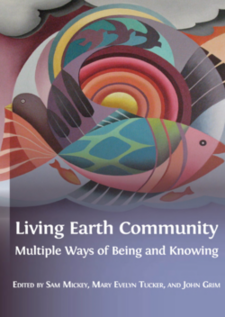|
|
“Living Earth Community: Ways of Being and Knowing the World” Conference
October 26-29, 2018
Oak Spring Garden Foundation
1776 Loughborough Lane
Upperville, VA, USA
Organizers
Participants and Papers
Schedule
Photos
News Articles
Resources
The insights of scientific and empirical modes of knowing are indispensable for understanding and responding to our contemporary environmental crisis. So also, we will need environmental approaches, such as law, economics, and technology. We recall, too, that other cognitive ways of knowing are manifest in culturally diverse pathways that treasure emotional intelligence and affective insight. These are evident in ritual and the arts—music, painting, literature, poetry, drama—that celebrate human experience in a more than analytical mode.
What is especially noteworthy is traditional environmental knowledge found among indigenous peoples that have both observational and affective components. This involves knowledge of lands and ocean, animals and fish, plants and trees. These many ways of knowing appear in a variety of human interactions with the natural world that include: the development of traditional herbal knowledge, healing practices, and agricultural cultivation. These diverse ways of knowing are also evident in the domestication of various crops such as rice, millet, wheat, corn, and tobacco. Similar observational knowledge of the migratory patterns of animals, birds, and fish is apparent among many native cultures. Indigenous oral narratives describe these understandings along with reflections on the beauty of an in-spirited living Earth. Thus indigenous people often speak of the natural world as filled with kin relationships requiring reciprocity and gratitude.
Science-that-sees-the-whole is beginning to appreciate these other ways of knowing without giving over its foundational empirical approach. Increasingly, these knowledge systems are understood as creative entanglements of the senses, cognitive faculties, and the environment. Over the last century new ways of understanding reality have moved from the periphery into more common usage that increasingly lead us toward creative engagement with cosmology. For example, ways of seeing reality at the quantum level as simultaneously particle and wave, as multicentered, and as foaming into and out of existence are beginning to challenge creatively our articulation of everyday life. Our mental horizon now embraces the comprehensible and the intuitive in ways that formerly would have been dismissed as contradictory or logically incompatible.
In addition, there is a growing appreciation for the multiple “intelligences” in the world. This workshop aims to explore some of those intelligences from plants and animals, to trees and forests, to fish and birds. It recognizes the value of indigenous, artistic, and modern ecological ways of knowing in which organic interconnectivity is acknowledged and affirmed. Those participating in the workshop bring an appreciation for multiple ways of knowing and multiple intelligences in the world. Their work reflects the careful attempt to “see the whole.” Our time together aims to further articulate that sensibility so that it may contribute toward a more robust and embodied valuing of nature.


